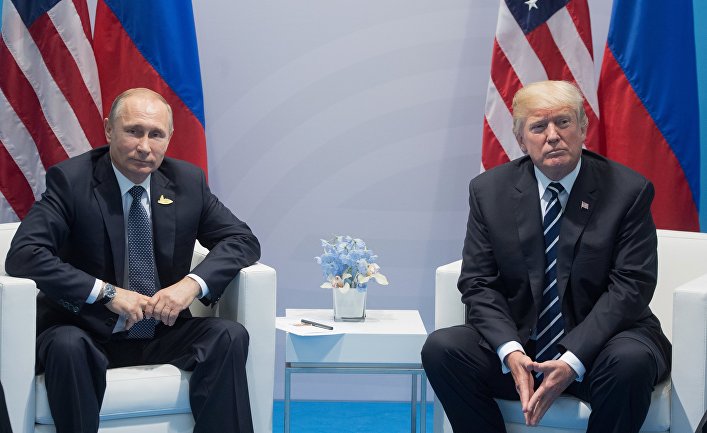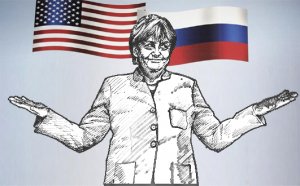James Carden
James Carden served as an advisor to the U.S.-Russia Bilateral Presidential Commission at the State Department from 2011-2012.
Attempting to isolate Russia over Ukraine could have more severe repercussions than Obama anticipates.
Over the weekend, Peter Baker of the New York Times reported that the Obama administration will now shift its long-term approach to Russia from one of engagement (via the much derided "reset” policy) to one of isolation in an attempt to limit Russia’s "expansionist ambitions in its own neighborhood” and effectively make it "a pariah state.” According to Baker, the administration is basically updating George F. Kennan’s Cold War policy of containment for the present day, the idea being to forge a global consensus against Russia’s revisionist foreign policy. This is an approach that intuitively makes a good deal of sense; it is, at first blush anyway, an indication that the administration is moving away from what has heretofore been an ad hoc approach to the breakdown in U.S.-Russian relations in favor of a more strategic and long-term vision.
However, there are a few points with regard to Containment 2.0 worth discussing, the first being whether a policy that aims to make Russia a "pariah state” bears any resemblance to Kennan’s conception of what his containment doctrine actually entailed. It seems to me what the administration is talking about is not really Kennan’s vision of containment, but rather that of his friend and ideological adversary, Paul Nitze. As Kennan himself noted over and over again in his voluminous literary output, the original iteration of the containment doctrine he laid out in 1947 was, for the most part, out-of-date the moment Joseph Stalin left the scene.
From that point on—and as the Khrushchev thaw became more and more evident—Kennan advocated for a policy of engagement with Russia; containment was, as he was at pains to point out, not a policy of military encirclement, nor was it a policy of engaging the Soviets in a series of proxy wars over peripheral and strategically worthless third-world outposts. That was, in fact, Nitze’s policy as first put forth in NSC policy paper 68 of 1950. It was that policy that successive U.S. administrations generally adhered to, not Kennan’s, and it is that militarized version of containment that is being urged on the Obama administration by establishment figures like the Washington Post’s Anne Applebaum who, in a Slate column last month, wrote that a new approach toward Russia was needed because "Russia is an anti-Western power with a different, darker vision of global politics.” To face down the revanchist Russian bear, Applebaum (who is married to Polish Foreign Minister Radek Sikorski) proposed that the West "re-imagine NATO” and "move its forces from Germany to the alliance’s eastern borders.”
Now perhaps the administration really is proposing a Kennan-esque rather than a Nitze-ian containment policy, but there is little to indicate this is so. The new policy, as laid out in Baker’s article, seems to be predicated on the assumption that the Russians have little or no means at their disposal to react. The administration’s focus seems to be on the costs it can impose on Russia, all the while neglecting the fact that Russia can—and will—counter-impose costs of its own. That the Russians have a fair amount of economic leverage over Europe is no secret; yet the costs they may be able to impose on the U.S. are more formidable than generally recognized. Is the administration willing to risk access to the Northern Distribution Network, over which the U.S. transports equipment and personnel to and from Afghanistan, over a crisis of Ukrainian sovereignty? Are efforts to isolate and make Russia an international outcast more or less likely to persuade them to assist in efforts to block Iran’s path to a nuclear weapon; or to work to help to defuse the ongoing Syrian fiasco; or to work with the U.S. in implementing the provisions of New Start; or to continue cooperating with the U.S. with regard to outer space? How, too, one wonders, would antagonizing Russia in the West affect the administration’s "pivot” to Asia?
The reasoning behind Containment 2.0 also seems to suffer from the post hoc ergo propter hoc fallacy. The administration (and even some of the more sentient members of Congress, few though they are) seems to believe that because Russia’s aggressive approach in Crimea (and, it now must be said, in parts of eastern Ukraine) took place after the reset, then the reset’s "accommodative” approach must be among the causes of said aggression. This is specious. The Russophone populations in eastern and southern Ukraine have for years been explicit in their desire to stay within Russia’s sphere of influence; "reset” or not, Russia was never going to allow Ukraine to leave its orbit for that that of the EU and NATO without a fight.
And then, of course, there is the issue of Obama’s choice to be the next ambassador to Russia. Reports out of Washington seem to indicate Obama is leaning towards appointing career diplomat John F. Tefft who served as Chief of Mission in Tbilisi during the Russian-Georgian conflict in 2008. According to Baker, the White House was initially wary of appointing Tefft because of his prior service in Georgia and Ukraine, but now "there is no reluctance to offend the Kremlin.” What is it that they think they did when they appointed Michael McFaul as the American ambassador to Russia? In lieu of agitating the Kremlin (as seems to be the preferred option at present) perhaps the responsible thing for the administration to do would be to re-appoint the now-retired but still widely respected John Beyrle, or to appoint someone with a reputation for both reasonableness and deep expertise like Georgetown’s Angela Stent. Unfortunately the Obama administration, and in particular the current iteration of its NSC, which is sorely lacking in imagination, historical depth, and intellectual ballast, will likely do nothing of the kind.
And so, unfortunately, the new approach as outlined by Baker seems to be (yet another) case of the Obama administration losing the forest for the trees and not realizing that a policy that isolates and punishes Russia over its provocations in Ukraine, while perhaps satisfying in the short run, makes securing U.S. national security interests in far more important areas than Ukraine that much more difficult.



_jpg/250px-ElbeDay1945_(NARA_ww2-121).jpg)









